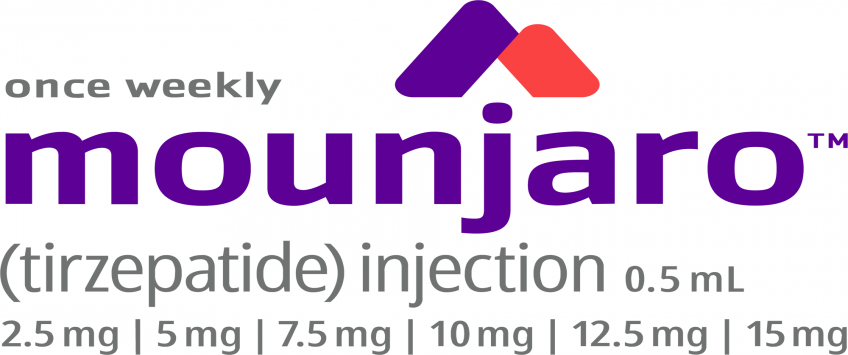Those with type 2 diabetes now have a new GLP-1-type treatment option: In May 2022, the FDA approved Eli Lilly's Mounjaro (trizepatide). Mounjaro has been touted as a game changer for its dual GIP and GLP-1 receptor agonist action in the broader field of endocrinology and metabolic health.
Discover why Mounjaro represents such a promising advancement in the GLP-1 class and what clinical trials have revealed about its ability to help patients lose weight. Read on to learn more.
Mounjaro is a once-weekly injectable therapy that helps to regulate blood sugar levels, like other well-known GLP-1 medicines such as Wegovy®, produced by competitor Novo Nordisk. Currently, it's only indicated for use in individuals with type 2 diabetes, but it may also help people lose weight.
According to research, dosing of tirzepatide reduced haemoglobin A1C levels and aided weight reduction in clinical trials. According to early findings, it may even lower the chance of cardiac events such as heart attack or stroke, although a study looking at this issue has not yet been completed.
The Mounjaro combination is intended to be utilized alongside other lifestyle modifications, such as food, sleep, and activity changes. It's anticipated that the medication will work best when used alongside expert assistance and coaching.
The recommended starting dose of Mounjaro™is 2.5 mg. After 4 weeks, dosages may be increased in 2.5 mg increments, as tolerated, up to a maximum of 15 mg once weekly. Doses are predetermined and monitored by a healthcare professional; they may also be adjusted to aid individuals in achieving their blood sugar, weight loss, and metabolic health objectives.
An extra molecule in MountjaroTM may give it a slight edge over other GLP-1 drugs.
The drug has a two-pronged mechanism that mimics the action of two incretin hormones that regulate blood sugar: glucagon-like peptide-1 (GLP-1) and glucose-dependent insulinotropic polypeptide (GIP). This first-of-its-kind dual impact makes it the first medicine to target both of these receptors.
"GIP is a hormone that may complement GLP-1 receptor agonists, according to a press release published by Eli Lilly. As shown in preclinical studies, GIP decreases food intake and increases energy expenditure, resulting in weight loss. When combined with a GLP-1 receptor antagonist, GIP may further decrease body weight, glucose and lipid levels."
When food is consumed, incretin hormones are released. In addition to promoting a feeling of fullness, they delay gastric emptying and activate brain satiety centres. In addition, they help normalize blood sugar by boosting insulin production in the pancreas and suppressing glucagon production. It is important to note that these events occur glucose-dependently, which means incretin hormones—or their imitations, such as agonists for GLP-1 and GIP receptors—don't cause severe hypoglycemia.
What about your natural incretin hormones, such as glucagon-like peptide 1 (GLP-1)? People who are overweight or obese have been shown in studies to have a reduced incidence of incretin effects, especially when they have had frequent weight fluctuations due to yo-yo dieting. GLP-1 therapy shrinks the gap, making achieving your objectives and reducing your metabolic set point easier.
The latest studies of Mounjaro have been making news even before the drug's FDA approval. For a good reason: Tirzepatide has outperformed several of its rivals in two separate research trials.
Mounjaro from Eli Lilly, was found to control blood sugar and help obese patients lose weight more effectively than Ozempic® (semaglutide) from Novo Nordisk in a 2021 head-to-head study. Participants in the SURPASS-2 trial saw an average reduction of 2.30 percentage points in A1c over the course of 40 weeks. With semaglutide, the reduction was 1.86 percentage points.
Even more intriguingly, the same study found that tirzepatide resulted in greater weight reduction than semaglutide: Up to 5.5 kg additional weight loss was observed with the former. The drug's two-stage action is said to be responsible for this difference.
According to a New England Journal of Medicine report, " In patients with type 2 diabetes, combined insulinotropic polypeptide receptor and GLP-1 receptor antagonists may have a greater impact than selective GLP-1 receptor agonists on glucose levels and weight control."
Mounjaro was studied in the SURMOUNT-1 experiment, which focused on weight loss and obesity treatment. It did not disappoint: at week 72, individuals on a 5 mg dose had an average weight reduction of 15%; those on a 10 mg dosage had an average weight reduction of 19%, and individuals on a 15 mg dosage had an average weight reduction of 20%. This was compared to a 3.1% weight loss for participants who received a placebo at this time point.
In a 2018 trial, dosages of Lilly's tirzepatide were compared with dulaglutide - a.k.a. Trulicity® - and "showed considerably better efficacy in terms of glucose control and weight reduction in comparison to dulaglutide, with acceptable safety and tolerability profile," according to researchers from the University at Buffalo School of Medicine & Biomedical Sciences. Tirzepatide side effects were comparable to those seen with dulaglutide; generally, they were well tolerated.
Tirzepatide was also compared with placebos and more traditional therapies, including insulin analogues. Tirzepatide, at a maximum dose of 1.5 mg/week, has consistently outperformed its competitors in reducing A1C and reducing body weight.
Mounjaro has been tested in four additional double-blind, placebo-controlled studies. Tirzepatide was compared against a placebo or to other therapies, including two long-acting insulin analogues in several trials. In all cases, the highest 15 mg/week dose of tirzepatide has resulted in greater A1C reductions and overall weight loss than its competitors.
Although Mounjaro has not yet been distributed to pharmacies, Weight Loss Coach doctors anticipate prescribing the drug once it is available. It will accelerate the rate at which we change how the world views weight by providing new, even more effective tools for our members.
Wegovy®, Ozempic®, Rybelsus®, Saxenda®, and Trulicity® are among the GLP-1 medications currently available to Weight Loss Coach members.

Comments